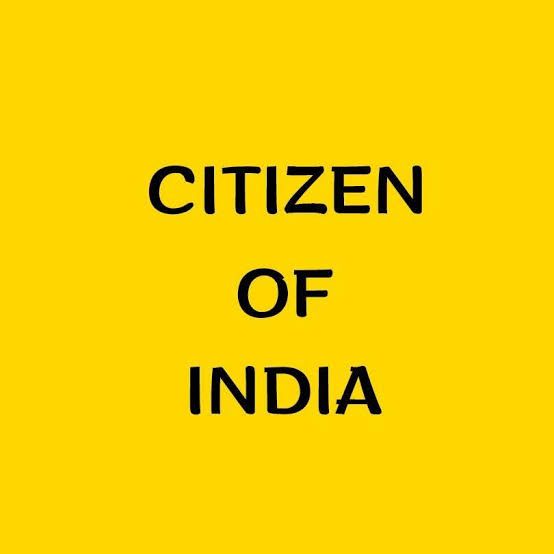
ABOUT CITIZENSHIP OF INDIA
A person’s legal status as a citizen is their legal recognition as a citizen of a nation or a sovereign state. Articles 5 through 11 of the Indian Constitution address the idea of citizenship of india. The enjoying of full participation in any State in which one has civil and political rights is referred to as citizenship.
Aboutcitizenship of india
- A person’s legal status as a member or legal citizen of a sovereign state is referred to as citizenship.
- “Citizenship” describes how a person interacts with the government. Being a citizen entails having freedom and all of its responsibilities.
- Indian State laws apply to citizens, who are considered full members of the state. They have unrestricted access to their civic and political rights.
- Because those who are not citizens are excluded, citizenship is an idea of exclusion.
- The awarding of citizenship is based on two widely accepted principles: The “jus sanguinis” acknowledges blood links, but the “jus soli” grants citizenship based on place of birth.
- The progressive idea of jus soli (1928) has been supported by the Indian leadership since the Motilal Nehru Committee.
- The Indian ethos was seen as irreconcilable with the racial idea of jus sanguinis, which was rejected by the Constituent Assembly.
Citizenship of india: Principles
- Jus Soli is Latin for “soil right”. According to this theory, a person becomes a citizen of the country in which they are born.
- The term “blood right” confers citizenship status regardless of the individual’s place of birth. One obtains citizenship using this principle if his parents were native to that country.
The Constituent Assembly rejected the idea of jus sanguinis because they believed it to be racist and incompatible with Indian principles. The jus soli was suggested by the Motilal Nehru Committee (1928) as a more suitable approach that complied with national principles.
Who is citizen of India?
When discussing about, who is citizen of india, all those who were domiciled in India on January 26, 1950, the day the Constitution went into effect, and who were either born there, or whose parents were born there, or who had been a regular resident of India for at least five years are declared to be citizens of india.
Citizenship rules in India
The citizenship rules in india are of different types. They are:
Citizenship by Birth:
- Anyone born in India on or after January 26, 1950, but prior to July 1, 1987, is granted citizenship.
Citizenship by Descent:
- If a person’s father was born in India, they will be regarded as Indian citizens if they were born on or after January 26, 1950.
- If a child is born outside of the country on or after December 10, 1992, and one of the parents is a citizen of india at that time, the child will be granted citizenship.
Citizenship by Registration:
- Everyone of Indian heritage who, prior to registering to become an Indian citizen, resided in India for seven years.
- Anybody who has lived in India for seven years after getting married to an Indian citizen and registering to become an Indian citizen.
Citizenship by Neutralization:
- Having been a regular resident of India for 12 years and meeting the 3rd Schedule of the Citizenship Act’s qualifications.
- Gives up citizenship in another country in order to obtain Indian citizenship; nevertheless, the country must not be one that does not grant Indian nationals citizenship through the Naturalization process.
- Must be a person of good character and proficient in at least one of the languages listed in the Indian Constitution’s 8thSchedule.
Citizenship by Incorporation of Territory:
- The inhabitants of that country will become Indian citizens if it annexes new land under its authority.
- Under the Goa, Daman, and Diu (Citizenship) Order, 1962, anyone who was born before December 20, 1961, in the territories that are currently part of the union territory of Goa, Daman, and Diu, or whose parents or grandparents were born before that day, shall be deemed to have become a citizen of India. India acquired the territory of Goa and Daman & Diu from the Portuguese.
Newcitizenship rules in india 2019
- As long as they arrived in India before December 31, 2014, the change would allow members of six communities, Hindus, Sikhs, Buddhists, Jains, Parsis, and Christians from Pakistan, Bangladesh, and Afghanistan, to stay in the country.
- Additionally, it lowers the citizenship requirement from eleven years to just five.
- These migrants were also released from the Passport Act and Foreigners Act through two notices.
- Numerous Assamese organizations voiced their opposition to the bill because it could give citizenship to undocumented Hindu immigrants from Bangladesh.
- The bill’s rationale claims that although Muslims make up the majority in Bangladesh, this cannot be stated for Hindus and Buddhists, who are minority groups in the country and moved to India to escape religious persecution.
The matter of citizenship continues to prove essential to India’s culture of democracy and fundamental constitutional principles as the country grows. Fostering communication and debate among policymakers, grassroots organizations, and individuals is crucial to ensuring that India’s citizenship laws retain the principles of fairness, equity, and inclusiveness for all its citizens.
For any latest news, legal topics, judiciary exams notifications, patterns, etc watch Jyoti Judiciary’s YouTube channel for legal videos for any updates at https://youtube.com/@jyotijudiciarycoaching4852?si=2cwubh9d2A9urwJf


